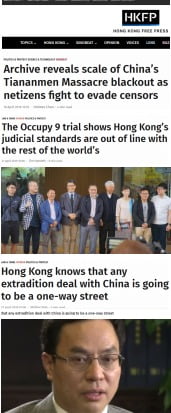Three interesting items to help ease ourselves back into the post-long weekend world of real life.
First, the University of Hong Kong’s Journalism and Media Studies Centre has archived 1,056 Weibo posts that Chinese authorities have deleted around June 4 every year from 2012 to 2018. (Archive here – you have to wonder how much longer HKU will tolerate such hostile forces’ unpatriotic historical nihilism masquerading as Western-style academic freedom.)
Second, the Occupy Nine, eventually found guilty of such arcane offenses as ‘incitement to incite others to commit public nuisance’, will be sentenced tomorrow. Whoever is making the decisions is facing a dilemma: make a mockery of the Beijing-ordered trumped-up charges by giving the convicted menaces to society slap-on-the-wrist fines or brief jail time; or further shred Hong Kong’s international reputation by condemning some harmless old souls to years in prison.
(Who wants to bet on a tortuously calculated, razor-thin balancing act between the two? A ‘win-win’.)
There is also the possibility – it should be an absolute certainty – of appeals. Several things stink about these political prosecutions, not least the lengthy delays involved. Here’s a must-read explanation, which our international media friends might find useful.
The timing of the sentencing is especially awkward because the world is also watching as the Hong Kong government rams through an extradition process to send criminal suspects to the Mainland. Officials hope to ease concerns by assuring everyone that our independent judiciary (the one sentencing Benny Tai et al tomorrow) will act as a safeguard.
What officials have not done is point out that a formal extradition system should be reciprocal. The prospect of Hong Kong getting hold of fugitives who have absconded to the Mainland would surely generate public support, right?
Our third item is another must-read story on this. In essence: Hong Kong’s anti-corruption cops and market regulators are nothing over the border, and high-level Mainland financial fraudsters with the right connections look set to remain safe over there. The extradition thing is all about sending people from Hong Kong to the Mainland, not vice-versa (or, more to the point, in all likelihood, instilling fear of being sent over).
The answer to the question is: you wouldn’t read any of these three stories in the South China Morning Post. To keep them coming, check out HK Free Press’s annual fund-raising drive.
(In fairness to the SCMP – hate picking on them – they do have some deserving content: here’s an infographic on the death penalty.)

